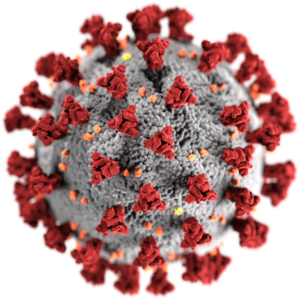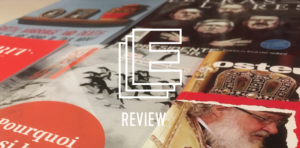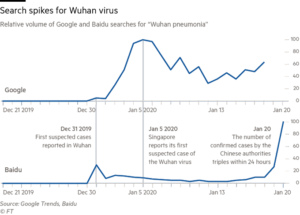The United States has accused China, Russia and Iran of carrying out disinformation campaigns related to the coronavirus pandemic, in what is an apparent effort to sow fear and confusion, The Hill reports. The European Union (EU) also believes Russia is carrying out disinformation campaigns in Western countries related to the virus.
The EU’s anti-disinformation task force, StratCom, warns that “pro-Kremlin disinformation aims at inducing distrust in national, European and international institutions; distrust in experts, the health care system and the individuals, engaged in the self-less work to help people affected by the virus”, The Brussels Times adds.
The Chinese people are heroes in this story, The Washington Post’s writes. Chinese doctors, researchers and journalists risked their lives and even died fighting the virus and warning the world. The Chinese public’s community solidarity holds lessons for us as our own situation worsens. The Chinese are also victims of their own government’s draconian measures, which caused massive extra suffering, he adds.

Wikipedia
“It is critical to remember that the Chinese people have no meaningful say in the measures taken by their government,” said Christopher Walker, vice president for studies and analysis at the National Endowment for Democracy (NED). “In the haze of authoritarian information curation and disinformation now coming from Beijing, we can’t lose sight of the massive authoritarian governance failure at the global pandemic’s point of origin.”
Beijing is tapping its old propaganda playbook as it battles the relentless coronavirus outbreak, the biggest challenge to its legitimacy in decades, Li Yuan writes for The New York Times. State media is filling smartphones and airwaves with images and tales of unity and sacrifice aimed at uniting the people behind Beijing’s rule. The problem for China’s leaders: This time, it isn’t working so well.
China’s COVID-19 disinformation campaign isn’t working in Taiwan due to the democracy’s resilience, analyst Yi-Ting Lien writes for The Diplomat. The Taiwan FactCheck Center (TFC), a local nonprofit fact-checking organization, pointed out that these messages have several characteristics that suggest they are fabrications.
At the height of the novel coronavirus outbreak in China, Zhao Shilin, a retired Minzu University professor and former member of the Central Committee and Deputy Director of the Culture and Arts Commission, issued two public letters to Xi Jinping concerning the government’s response to the outbreak, by Sophie Beach writes for China Digital Times:
 The first letter, on February 23, stated that the government had “missed the most important ‘golden window’ of time to combat the epidemic—the time around [Chinese] New Year… [resulting] in the epidemic spreading with great ferocity. The costs of this mistake are enormous. The lessons we must learn are unspeakably painful. The losses, immeasurable.” Censorship and obfuscation of information about the virus’ spread and severity have been widely blamed for its rapid transmission in the early stages of the outbreak.
The first letter, on February 23, stated that the government had “missed the most important ‘golden window’ of time to combat the epidemic—the time around [Chinese] New Year… [resulting] in the epidemic spreading with great ferocity. The costs of this mistake are enormous. The lessons we must learn are unspeakably painful. The losses, immeasurable.” Censorship and obfuscation of information about the virus’ spread and severity have been widely blamed for its rapid transmission in the early stages of the outbreak.
“As for how this grand human error resulting in this outbreak and its ferocious spread could have happened, I humbly offer these five reasons,” Zhao added:
- The Habitual Use of Extreme Social Stability Measures: For a long time, the ingrained notion of “stability overrides all” has twisted how we treat so many societal problems. Upon careful examination of this “extreme stability” principle, all negative events, including both natural and made-made disasters, are seen as threats to stability. Both undermine the system’s image as being stable…..
 The Institutional Practice of Only Reporting Good News, Not Reporting Bad: The system encourages the reporting of good news and discourages reporting bad news. This has been a long-standing practice. Those lower on the totem pole report good news to higher-ups and avoid bad news to curry favor, to fish for political capital. Higher-ups report only good news to the public, constructing an image of infallible political authority. …..
The Institutional Practice of Only Reporting Good News, Not Reporting Bad: The system encourages the reporting of good news and discourages reporting bad news. This has been a long-standing practice. Those lower on the totem pole report good news to higher-ups and avoid bad news to curry favor, to fish for political capital. Higher-ups report only good news to the public, constructing an image of infallible political authority. …..
- Rigid Institutional Supremacy: Supremacy is a chronic disease within a system. This has become an even larger problem over the last several years. In a system of governance, authority resting solely at the very top inevitably results in stiff, mechanical incompetence. Officials at all levels focus solely on those above them, everything revolves around power. In the face of a menacing epidemic, there is a lack of initiative, flexibility, focus, and responsibility, inevitably leading to loss of precious time and endless consequences. …..
- Loss of Functioning Civil Society: Because of the institutional constraints on its structure, our society is one that is completely controlled vertically, without any horizontal connections. We are a society that is all longitude, no latitude. Having such a one-dimensional society means the loss of self-autonomy and the ability to help ourselves and our communities. Faced with this horrible epidemic, we can rely only on the vertically structured bureaucracy of the Party and government. Inefficient, slipshod. Twice the effort for half the result. ….
- Lack of Information Transparency: We live in the Information Age, ease of access to and the transparency of information are basic conditions for maintaining the normal operation of society. This is particularly true during a public health crisis. As experts point out, rapid response is crucial in addressing public health issues. Information on an epidemic should be made public as soon as possible. Every day, every hour represents valuable time to contain the virus.
 Taking advantage of a deadly global pandemic to harass opposition groups may seem like blatant opportunism—and it is—but it’s also ordinary behavior for the Azerbaijani government. In 2014, the opposition Popular Front party accused the government of causing an explosion in their office, the
Taking advantage of a deadly global pandemic to harass opposition groups may seem like blatant opportunism—and it is—but it’s also ordinary behavior for the Azerbaijani government. In 2014, the opposition Popular Front party accused the government of causing an explosion in their office, the
“It’s really cheap and easy to go after a group like D18, especially under the guise of public health. They can probably go after them like this without facing a big public backlash,” Elspeth Suthers, a senior program officer for Eurasia at the National Endowment for Democracy (NED), told me….Alex Rafouglu, an Azerbaijani-American journalist who also serves as Amnesty USA’s country specialist on Azerbaijan and Georgia told me that “it looks like the government is trying to take personal revenge and using every opportunity, including disasters like coronavirus, to silence these critics.”

Eurozine
From genocidal accusations to alleged cures, the coronavirus pandemic is accompanied by a swath of conspiracy theories, note analysts Péter Krekó and Patrik Szicherle. Conspiracy theories and rumours often spread in the wake of negative events, especially if these events are new and partly unknown. This is exactly what happened in the case of the coronavirus, they write for Eurozine:
The problem goes well beyond the clickbait disinformation sites. While the Hungarian police cracked down on some disinformation sites spreading panic about the coronavirus, the Hungarian government, especially at the first phase of the epidemic, used its media empire to spread disinformation themselves about the sources and origin of the crisis in a strong communication scapegoating effort.
“Democratic societies build resilience by strengthening the engagement of their citizens, because that is the way to build consensus and also to generate new ideas that work,” notes one observer. “There has not been a time since the second world war when the voice of citizens needed to be heard as much as it needs to be heard today.”
The Real Pandemic Danger Is Social Collapse, former World Bank economist Branko Milanovic argues in Foreign Affairs.
Yuval Noah Harari considers The world after coronavirus, in The Financial Times.

China Digital Times
Beijing’s attempts to elude blame for the Wuhan virus will backfire, says analyst Charles Lipson. China was already facing a major global backlash for covering up the viral outbreak, which began in late November. By December, senior party officials in Beijing knew the gravity. They chose to keep it secret and allowed tens of thousands of people to fly out of China each week to Europe, North America, the Middle East, and Asia, he writes for The Spectator.
As the world tries to contain the spread of the coronavirus epidemic, it needs to heed the message coming from Chinese democrats, which is that we all have a stake in China becoming a more open, democratic, and trustworthy political system, wrote Carl Gershman, the president of the National Endowment for Democracy (NED). As the famous Soviet dissident and writer Aleksandr Solzhenitsyn said in In his 1970 Nobel Lecture in literature, “there are no internal affairs left on our crowded earth.” [or, to put it another way, whatever happens in Wuhan, doesn’t stay in Wuhan].
 See also (HT: Daniel S. Hamilton’s Transatlantic Reads):
See also (HT: Daniel S. Hamilton’s Transatlantic Reads):
Global – How We Can Beat the Coronavirus, Aaron E. Carroll and Ashish Jha, The Atlantic
Global – Drawing our new normal, Politico
US – Pandemic polarization, The Economist
Russia – Coronation, Coronavirus, and the Economy: The Economic Backdrop of a Fifth Putin Term, Cyrus Newlin, Jeffrey Mankoff, CSIS







